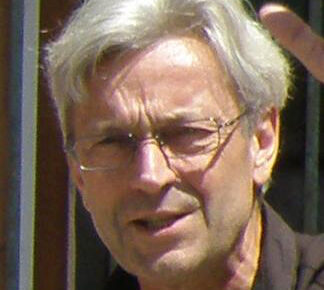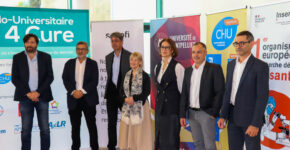Christian Jay-Allemand: solution seeker
Professor at the University of Montpellier within UMR Iate, Christian Jay-Allemand puts teaching and public research to the test of interdisciplinarity and business creation. Last October, he and his colleague Luc Bidel won the Carnot Grand Prize for Partnership Research for their work on natural antifungals with the company Antofenol.

A researcher, director of research at INRAe and then professor at the University of Montpellier, Christian Jay-Allemand has had a distinguished career as a scientist. However, when he talks about his career as a biologist, he does not paint a picture of a researcher in his laboratory, but rather a complex organizational chart that brings together different disciplines and teams, students and industrialists, fundamental research and engineering, etc. He has experimented with this model in the engineering master's programs (CMI). These selective courses, launched in 2012 at the instigation of Gilles Halbout, former director of the Faculty of Sciences, offer project-based teaching to small classes of around 20 students. "At the University of Montpellier, we have set up eight programs in biology, biotechnology, optoelectronics, chemistry, mechanics, computer science, etc. Eight CMI programs but a single teaching team to promote this model and supervise enthusiastic students," says Christian Jay-Allemand, who is full of praise for these programs. As director of the CMI BBB (Biotechnology-Bioresources-Biotraceability), he has worked with his colleagues to build a coherent five-year curriculum comprising more than 70 teaching units.
Carnot Prize with "a great success"
" The CMI's teaching approach puts students in the position of project leaders tasked with solving environmental, health, food, and other problems. These problems are sometimes proposed directly by local companies, which are thus involved in the training," emphasizes the director, who acknowledges that the CMI label, awarded by the national FIGURE network, opens many doors for young recruits, which sometimes makes it difficult to retain them after they graduate. From this adventure, Christian Jay-Allemand highlightsone"great success" in particular: the creation of the company Antofénol by Fanny Rolet. "This former student came to see us with her project to use vine shoots to produce natural fungicides. " The project combines microbiology and chemistry to confirm the fungicidal potential of vines and identify the processes for extracting and concentrating the active substances, as well as mechanics and engineering to invent the machine capable of extracting these fungicides. All the ingredients are therefore in place to put interdisciplinarity and public-private partnership to the test.
The gamble paid off, as the IATE (Agopolymer Engineering and Emerging Technologies) is working on the biology and chemistry aspects in collaboration with Luc Bidel fromINRAe and Bernard Orsal's team from the Institute of Electronics and Systems (IES), which is working on the manufacture of an eco-extraction prototype based on the control of microwaves and ultrasound. "This project functioned as a kind of Lab-Com, where Professors, researchers, and engineers formed a close-knit team combining fundamental and applied approaches and offering a rich training environment for our students,"says Christian Jay-Allemand. In addition to winning the Carnot Prize in 2022, this project has been an industrial success: the company Antofenol has set up a 20-person factory in Plestan, Brittany, while maintaining a private research team at the heart of the laboratory, made up of former master's and doctoral students.
Creating links between academia and local businesses is a very promising avenue for someone who has had experience collaborating with large industrial groups. "For example, I worked with the international Solvay Group. The collaboration proved to be very compartmentalized and caused difficulties for our doctoral student. This experience made me think a lot about the link with companies. The strategies of these large groups have their own logic that does not intersect with that of research. What's more, they do not offer employment prospects for ourstudents,"says the professor.
Promising molecular fingerprints
This year, as the latest class of CMI BBB graduates, Christian Jay-Allemand defends "the strength of our university center, which thrives on these training-research combinations and is gradually changing our way of thinking and operating. Even though I recognize that not all of my academic colleagues share this view. " This methodology is nevertheless retained in the new bachelor's and master's degree programs, such as the master's degree in wood sciences. This is an interdisciplinary master's degree in terms of student recruitment—with students coming from biology, chemistry, but also mechanics and architecture—and in terms of teaching, with 45 teachers and around 100 companies involved. "This master's program continues to operate on a project basis in conjunction with local companies. For example, the company Neofor in Mende asked students to work on recycling its sawmill wastewater. An ad hoc study was launched, focusing on the recovery of wood tannins, "he explains.
Christian Jay-Allemand has shown remarkable consistency in his research since completing his PhD at the University of Montpellier in 1985. The researcher has worked tirelessly to understand, at the cellular level, the biological mechanisms based on interactions between phenolic molecules and proteins, interactions observed in particular through the study of fluorescence. Variations in light emission from proteins provide a better understanding of inhibitory actions, for example. In recent years, this research has continued to focus on interactions between polyphenols and enzyme proteins with a view to identifying new cellular functions.
Even though he is beginning to consider retirement, Christian Jay-Allemand's eyes still light up when he talks about the future. His sights are set on developing agroforestry projects combined with biotechnology in partnership with municipalities in the Hérault region, and he hopes to see the emergence of a start-up that would capitalize on the results of the Esbac (selective eco-extraction of active biomolecules) project launched in 2018 with the company Antofénol. Managed by the University of Montpellier, this project has developed molecular fingerprints designed to fix molecules and then concentrate or eliminate them. "A very promising tool that can be used in many ways to enrich or detoxify an environment,"says the enterprising professor.
